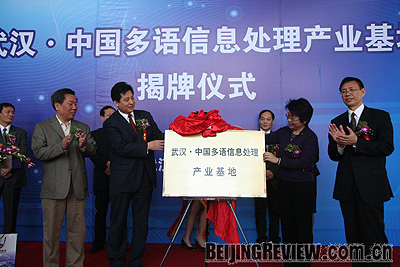|

Wuhan China Multilingual Information Processing Base officially opened recently at the Wuhan Eastlake Hi-Tech Innovation Center. In accordance with the country's strategy on service outsourcing and the international translation service industry, Wuhan began to put its development plan for a multilingual data processing base into practice.
Ever since the implementation of the reform and opening-up policy, translations have played a more vital role in China's politics, diplomacy, economy, military, technology, culture, global communication and print media. With the expansion of the market, China's translation industry witnessed a soaring increase. According to available statistics, there are now more than 3,000 translation institutes in China, and the value of the total market has reached 30 billion yuan ($4.4 billion). Breaking away from individual translation workshops and forging a large-scale industrialized translation industry still remains a grim challenge.
TranSn Information Technology Co. Ltd., also known as TranSn, is a translation company in China that was founded on January 20, 2005. As the sole multilingual partner of the official website of the Chinese Olympic Committee, TranSn has launched its multilingual data processing system.
Combining new technologies in education, software outsourcing, publishing, webpage design and cartoons, this system is able to offer a multilingual solution for clients and will be of great importance for the development of China's translation industry.
According to the development plan, Wuhan China Multilingual Information Processing Base will have a production volume of 5 billion yuan ($744 million) in the next two or three years, accounting for 20-30 percent of the whole market and providing 30,000-50,000 job opportunities.
Guo Xiaoyong, Executive Vice President of the Translators Association of China, points out that with global economic integration, language information processing has become a crucial chain in international communication and an important demonstration of cultural strength and impact.
The launch of Wuhan China Multilingual Information Processing Base will promote the development of the translation industry by way of multilingual information processing, which enables it to better meet client demands, Guo said. He also highly praised its role in improving China's cultural strength and overall competitiveness.
The launch of the Wuhan China Multilingual Information Processing Base is in accordance with the scientific outlook on development and Wuhan's position in experimental reform, said Zheng Yongxin, Vice Chairman of the Standing Committee of Wuhan People's Congress.
Wuhan, designated as a translation talent base by UNESCO, has more than 1 million students in universities and colleges, ranking the city the first in this field in China. Wuhan's rich human resources and low human resource costs provide a top opportunity for the development of the multilingual data processing industry.
Wuhan China Multilingual Information Processing Base will be a new symbol of Wuhan City, central China's Hubei Province, Zheng said. To promote the development of the multilingual information processing base, Wuhan Eastlake Hi-Tech Innovation Center will offer a series of preferential policies regarding organizing, capital and employees, said Sun Qianwen, Deputy Director of Wuhan Eastlake Hi-Tech Innovation Center. She went on to explain that the preferential policies would include lower rent, tax cuts and capital support for innovative projects. The support from the government would help forge the complete industry chain centering on the multilingual data processing industry, Sun said.
Sun said a total of 200 representatives from the government, research and development institutions and world famous enterprises would attend the first World Summit on Multilingual Information Processing in Wuhan on May 28. | 